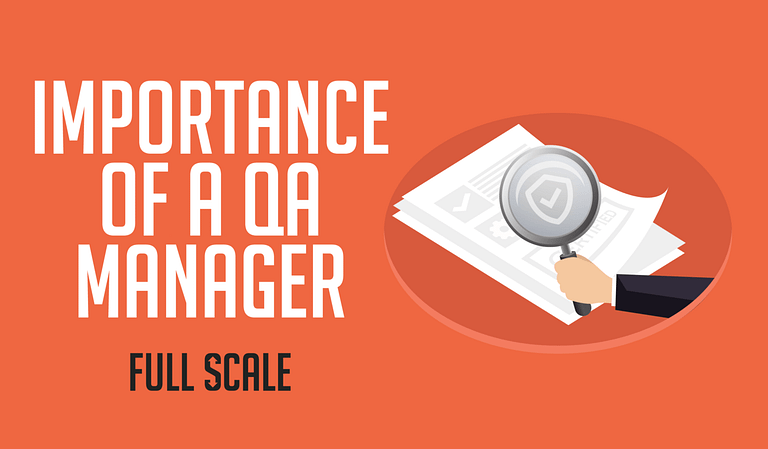Every company follows industry standards for each product in the market. That is why most businesses employ a team of testers and a QA manager. But if you already have QA professionals, is it still necessary to hire a QA manager? Let’s find out.
It’s a PR nightmare! Failing to meet industry-set criteria spells big trouble for any brand. We’re not only talking about financial loss, but also about brand reputation.
Some companies manage to pull through from a crisis. Remember the Samsung Galaxy Note 7 fiasco in 2016? Fortunately, after the backlash on battery malfunctions, it made a successful comeback. But others aren’t as fortunate as they weren’t able to recover from a negative brand image.
Thus, to avoid wasting millions of dollars on product research and marketing, every company needs QA professionals. This team tests and reports potential issues before the product becomes available for consumer purchase.
But given that the team can already review product specifications, is a QA manager necessary? What are the duties and responsibilities of the position? Why is it important in the whole business picture?
What A QA Manager Does: An Overview
A quality assurance manager’s main role is ensuring that the product works well under the threshold of acceptance based on industry standards. In addition to that, the QA manager must ensure that consumer expectations will be met. This is especially important for manufactured goods and software products.
To make this happen, the QA manager plans and implements quality assurance programs. The professional is also responsible for formulating policies for product quality control to lessen waste. Moreover, the manager serves as a coordinator between the QA team and other departments to resolve potential problems.
So what are the top industries that may need a QA manager? Manufacturing, engineering, automotive, pharmaceutical, textile, and IT/technology benefit from the role’s contribution to the business.
QA Manager Tasks: Reasons to Hire One
The quality assurance job description for a manager may vary from one company to another. But these general tasks are expected regardless of the industry you’re in.
Manage the team daily
As QA specialists are responsible for inspecting the products, the quality assurance manager is expected to supervise the team. The manager must make sure that everyone is productive as they carry out detailed product assessments.
The QA manager also recruits team members when necessary. Most importantly, the manager plans and implements programs to constantly improve quality assurance testing.
For instance, the QA manager looks for tools and software to make a process more efficient. Or if a line of product is defective, the manager has the authority to stop the production. And study the issue further to avoid more potential waste.
Supervise the processes and documentation
As the leader of the QA team, the manager oversees the whole quality assurance process. Whether it’s product testing or reporting defects, the QA manager is responsible for the accuracy of each task. In addition to that, the head of the team also has to stay updated on all internal, external, and industry regulations.
The professional is also responsible for preparing and updating internal and external manuals and protocols. Along with that, quality documentation depending on recognized standards must be handled by the manager.
For example, any documentation must be updated according to the latest ISO 9000—Quality Management. Or a QA manager for a software team defines and documents the software quality assurance standards.
Furthermore, the quality assurance manager is responsible for interdepartmental communication. Since the QA team may be collaborating with other teams, the QA manager should facilitate a smooth communication system to avoid any misunderstandings.

Spearhead the testing activities
How to avoid trouble during testing? The quality assurance manager must organize testing activities and assign specific tasks to QA analysts beforehand.
This means that testing schedules and other task information are set and disseminated to the team. When doing frequent quality checks, a clearly defined testing process makes things more efficient.
Analyze business data pertaining to product quality
After overseeing the testing activities, the manager handles statistical analysis from the production lines. The QA manager then identifies any problem in quality for a certain batch. When it happens, the manager also recommends improvements on quality control or production processes.
Are there consumer complaints regarding low-quality products? The QA manager will investigate it further by going through production details, like the batch numbers and testing results.
The manager also analyzes patterns and trends over time concurred from the reports. After that, the manager will report any anomalies leading to the complaint or debunk the issue with proof.
Conduct employee training for skills development
Industry standards may undergo constant changes based on various market factors. To make sure that the team is up-to-date on the latest trends and tools, the QA manager must train them.
Aside from upgrading the skillset, it’s also important that every QA specialist knows the updated quality requirements. Moreover, to regularly improve productivity, sharing best practices in conducting testing activities is an advantage.
Check the quality of raw materials and components
The overall quality of a product is dependent on the quality of its parts. That is why QA managers have to work with suppliers and other third-party vendors. The collaboration ensures that every component adheres to the quality standards set by the company.
Why? It minimizes the time and effort of testing when components are high-quality. Most importantly, any slight deviation from the product’s overall quality can be detected and corrected immediately.
For instance, in the software industry, the development team is using serverless architecture. This means the team is using the services of a third-party vendor, like Google Cloud Functions. Hence, the QA manager has to work with the service provider for the implementation of local and remote testing.
The QA Manager’s Impact
The QA manager aims to improve product quality and process efficiency to reduce costly mistakes. Without the QA manager, the quality assurance team won’t have a coherent direction.
No one will oversee the testing activities and interpret the results to make them useful for the business. No one is accountable for the efficiency and productivity of the team. And, no one is responsible for the continuous improvement of quality for a specific product.
These are the reasons why companies prefer to hire a QA manager. With a professional responsible for quality assurance, it lessens the risks of costly mistakes in the market.
Aside from hiring QA managers, are you also looking for tech solutions to scale your business?
Full Scale has the right services for you. We specialize in customizable software solutions for your business needs. Since we take care of the recruitment process, you can easily build your team at a competitive cost.
Whether it’s for iOS or Android platforms, or a programmer for C# and Python—we have the right people for you. And don’t worry, our rigorous technical skills assessment makes sure that everyone working on your project is highly qualified and experienced.
Let us help you scale your business in the right way. Talk to us now!




